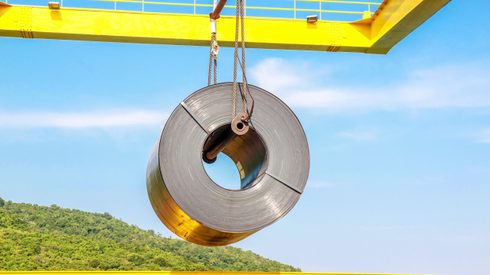For steel products, duties will fall to 9.6% from 10.8%, and for aluminium, the decrease will be to 4.8% from 5.4% – both from June 1 of this year until December 31, 2023. Steel rebar had its import taxes slashed to 4% earlier in May.
Aluminium ingot in particular will not be affected because it is duty-free up to a limited volume of 350,000 tonnes this year, but aluminium billet was included in the government’s decision.
Steel and aluminium imports have not been that significant this year due to rising ocean freight rates, shipment delays, high local inventories and more competitive prices from domestic producers.
Fastmarkets’ price assessment for steel hot-rolled coil, import, cfr main ports South America was $870-910 per tonne on May 20, down by $30-40 per tonne from $900-950 per tonne a week before and by $125-165 per tonne from $995-1,075 per tonne a month earlier.
This price drop prompted steelmakers to partially backpedal on a 20% average increase applied in April. That increase was announced after months of selling domestic products at a small premium over imports – or even at a discount.
Meanwhile, Fastmarkets assessed the aluminium P1020A premium, cif dup Brazilian main ports at $500-530 per tonne on May 17, a $10-per-tonne increase from $500-520 per tonne on May 3.
Spot interest in Brazil for aluminium from abroad has been close to non-existent in 2022 due to lower domestic premiums and clients being mostly supplied under longer-term contracts – many of which were actually signed for delivery in 2021.
As with the previous 10% duty cut, this recent move by the Brazilian government encompasses 87% of all tariff codes in the Mercosur trade bloc. It was justified with other Mercosur members and to the general public as an action to control inflation in the country.
“This generates an improvement in productivity and reduces costs in Brazil,” the executive secretary of the economy ministry, Marcelo Guaranys, said in a press conference on Monday May 23. “This is initially a temporary move, but we’ll keep negotiating [with other Mercosur countries].”
Guaranys added that this opening for trade is an end goal for the ministry of economy, Paulo Guedes, following instructions from Brazilian president Jair Bolsonaro.
“This was approved on an urgent basis because of inflationary pressures amid an adverse global scenario,” foreign trade secretary Lucas Ferraz said. “We used Article 50 of the Montevideo treaty that takes into account exceptions [to change common duties in the bloc]… and have been discussing with Uruguay how to make these changes definitive.”
Steelmakers have long opposed such duty reductions, especially if no other action is taken to diminish overall taxes in the Brazilian economy. When rebar duties went to 4%, steelmaker association Instituto Aço Brasil said it was unjustified and went against global trends.
Back when Bolsonaro was elected in October 2018 and Guedes was already hinting at opening up Brazil’s economy to international trade, mills were worried changes would be rushed and include no domestic compensation, hurting the local industry.
During a press conference on Tuesday to discuss data from flat-rolled steel distributors in April reported by sector association Inda, executive president Carlos Loureiro shared similar comments.
“The government needs to be careful,” Loureiro said. “They cannot act in the heat of the moment and dismantle this important industry [of steelmaking] that has gone through difficult moments in the past. Think four to five years ago, when Usiminas had to take capital from their shareholders.”
“It isn’t possible to completely liberalize trade for the steel industry when you have capacity in excess around the world. There’s going to be trouble if you don’t have a minimum barrier against imports,” Loureiro added.




